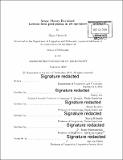Scope theory revisited : lessons from pied-piping in wh-questions
Author(s)
Demirok, Ömer
Download1142635477-MIT.pdf (11.06Mb)
Alternative title
Lessons from pied-piping in wh-questions
Other Contributors
Massachusetts Institute of Technology. Department of Linguistics and Philosophy.
Advisor
Sabine Iatridou, Norvin Richards, and Roger Schwarzschild.
Terms of use
Metadata
Show full item recordAbstract
It is widely assumed that both the movement-based theory of scope and the scope-based theory of intensionality fall short in the face of empirical challenges like 'exceptional' scope out of extraction islands and the possibility of transparent/de re construals for DPs inside extraction islands. The standard response to these challenges consists in assuming that grammar makes available in-situ methods of scope-taking in addition to movement- (e.g. pointwise composition (Hamblin, 1973; Kratzer and Shimoyama, 2002; Cable, 2010), choice functions (Reinhart, 1997, 1998)) and adopting a richer representation of intensionality (e.g. in-situ binding of world/situation-denoting pronouns (Percus, 2000)). This thesis argues that a closer study of pied-piping in wh-questions reveals the true power of already-existing tools in grammar. Building on the important insight that more complex scope-takers can be recursively built (Dayal, 1994; Charlow, 2017), I advance the idea that grammar makes crucial use of pied-piping to generate meanings that would otherwise be unavailable. I argue that with pied-piping in its toolbox, grammar may not need in-situ methods of scope-taking and in-situ methods of assigning DPs a transparent/de re construal.
Description
Thesis: Ph. D. in Linguistics, Massachusetts Institute of Technology, Department of Linguistics and Philosophy, 2019 Cataloged from PDF version of thesis. Includes bibliographical references (pages 187-195).
Date issued
2019Department
Massachusetts Institute of Technology. Department of Linguistics and PhilosophyPublisher
Massachusetts Institute of Technology
Keywords
Linguistics and Philosophy.